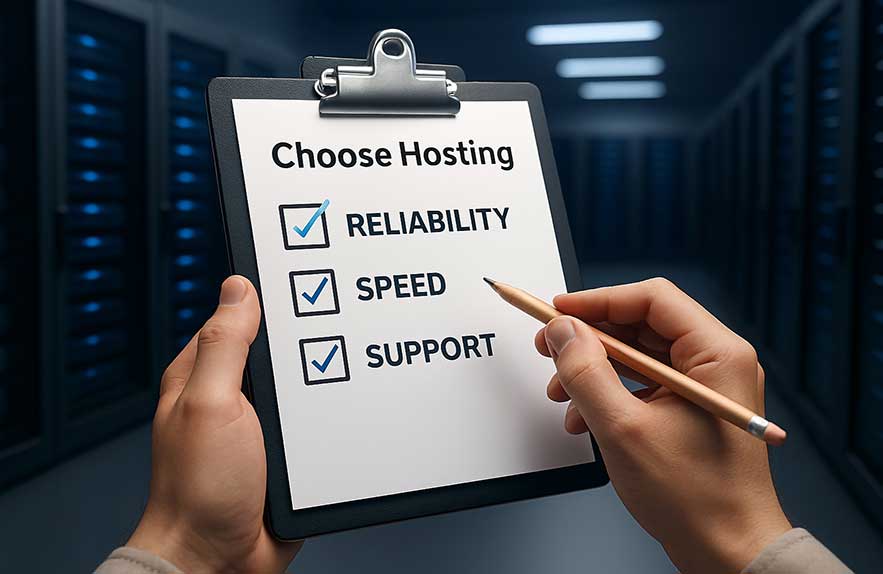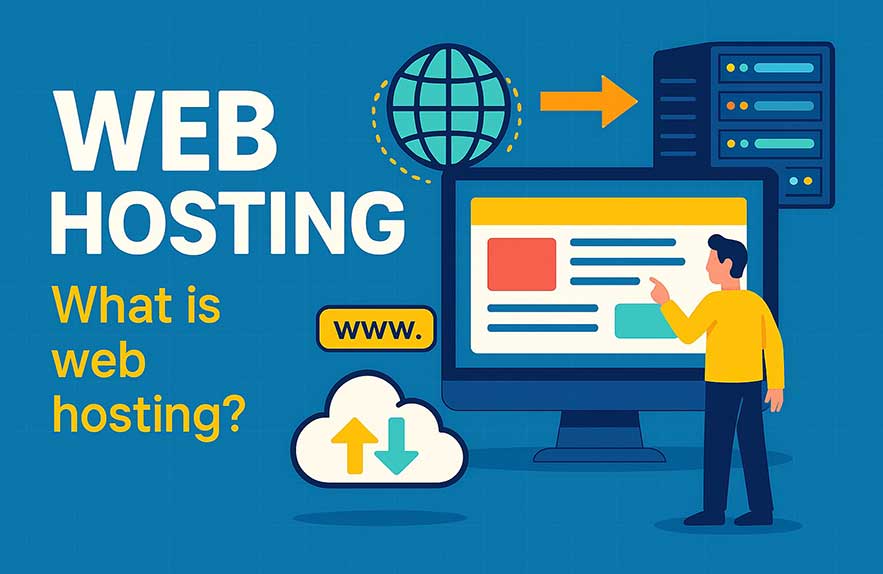
Why Choosing the Right Hosting Provider Matters in 2025
In 2025, the world of websites is more crowded and competitive than ever. For anyone dreaming of starting a new blog, launching an online shop, or building a business portfolio, figuring out how to choose a hosting provider is often one of the first “real” decisions on the road to success. But let’s be honest—hosting isn’t the flashiest part of building a site, so many new site owners simply pick the first name that pops up in an ad or a basic Google search. The reality is that picking the wrong provider can mean slow site speeds, unexpected downtime, security scares, and a lot of headaches you don’t need when you’re already busy building your dream.
Why does it matter so much? Your hosting provider is more than just a place to park your domain. Think of it as the silent engine running under the hood of your entire business or creative project. A top-quality host stops would-be hackers, recovers your site if something goes wrong, and gives visitors the fast, smooth online experience that keeps them around. On the flip side, settle for the wrong provider and you’ll spend more time submitting support tickets than growing your audience. I’ve heard stories from business owners who lost days (or weeks) of revenue just because of poor hosting decisions.
In today’s digital world, website speed isn’t just about impressing the tech-savvy crowd. It’s directly tied to higher search engine rankings and better sales figures; even small improvements can have a big impact. Security, backup reliability, and 24/7 support also matter to beginners and established companies alike. That’s why so many businesses now take the time to really learn how to choose a hosting provider—not simply following a friend’s advice or picking the lowest monthly price. The process deserves thought, research, and a checklist tailored to your own goals.
This guide is specifically for folks who aren’t techies by trade—whether you’re a small business owner, a solo creator, a community builder, or just dipping your toe into the world of blogging. I get how easy it is to get lost in a sea of jargon when you start reading about disk space, bandwidth, and SSL certificates. You want clarity and confidence, not confusion. That’s exactly what you’ll find here: real advice, simple steps, and no-nonsense tips to help show you how to choose a hosting provider for your unique situation.
Over the next few sections, we’ll break down the must-know tips for picking the right host, show you which features actually matter, and spotlight real dangers and “deal-breakers” most people don’t notice until it’s too late. Ready to find a partner that powers your website’s growth in 2025? Let’s start with the features every beginner—and every business—should compare before signing up.
Table of Contents
- Why Choosing the Right Hosting Provider Matters in 2025
- 8 Key Hosting Features You Should Always Compare
- Shared, VPS, Cloud, and Dedicated Hosting: What’s Right for You?
- Hidden Costs and Limitations Most Hosts Don’t Tell You About
- Best Hosts for Small Businesses (And Why We Recommend Them)
- Final Checklist Before You Commit to a Host
8 Key Hosting Features You Should Always Compare
If you ask any expert for tips for choosing hosting provider, they’ll all start with this: don’t just look at the price tag. A great host is about far more than a catchy promo deal or a well-designed homepage. Before you commit to anything, you should compare at least eight core features—no matter your budget or website goals. These essentials will help you spot real value and steer clear of the most common “gotcha” moments in the world of hosting.
1. Uptime Guarantee: The best hosting providers promise their servers will be online 99.9% of the time or better. Anything less puts your business or blog at risk. If their policy is vague, move on. You can check verified uptime claims with free tools like Pingdom to see how hosts really perform.
2. Website Speed: Your visitors hate waiting, and search engines are even less patient. Fast load times give you a huge competitive edge—so dig into real-world speed reviews and look for turbo-boost extras like SSD storage or built-in caching. The GTmetrix speed tester is a useful tool to compare hosts’ loading times on actual websites.
3. Storage and Bandwidth: Make sure your plan covers your content (photos, downloads, videos) without hidden “fair usage” limits. Unlimited doesn’t always mean unlimited; check the fine print and ask questions if you’re unsure.
4. Free SSL Certificates: Security is a must—even for small sites. Look for hosts that include free SSL certificates as part of their standard offering. This keeps your visitors and their data safe, and it’s now required for most online stores and even basic contact forms.
5. Backups and Restore Options: Even the best tech can fail. A good hosting plan runs daily or weekly backups, with easy one-click restore. Avoid providers that hide this feature behind expensive upgrades—it should be standard, not a pricey extra.
6. Customer Support Quality: Around-the-clock support isn’t negotiable if your website runs a shop, community, or key business tool. Test their response speed before signing up—and see if “24/7” means real help, not just an automated chatbot queue.
7. Control Panel Usability: The best hosts offer a control panel (like cPanel or a custom dashboard) that’s clean and easy for non-geeks. You shouldn’t have to Google every setting or risk breaking your site just to add an email address.
8. Room to Grow (Scalability): Maybe you’re starting with a tiny audience now, but the right host should let you upgrade easily—whether that’s extra storage, more sites, or a shift to cloud or VPS hosting as your business expands.
The best tips for choosing hosting provider always come back to this checklist. Red flags to watch for include hidden fees for things like email accounts, backup restores, or basic security, and upsells that lock you into long contracts with steep renewal rates. Compare carefully, take your time, and don’t be afraid to ask support direct questions before you pay. In the next section, we’ll break down the main types of hosting—and help you decide which service best matches your plans for the coming year.
Shared, VPS, Cloud, and Dedicated Hosting: What’s Right for You?
One of the toughest parts of learning how to select hosting service is figuring out the difference between all the types of hosting out there. It’s not just a matter of price—each option fits different websites, goals, and even personalities. If you’re feeling stuck, you’re not alone; plenty of smart business owners and creators spend hours comparing “shared” versus “cloud” and still wonder if they’re making the right call. Here’s a human breakdown of the most common plans you’ll find—and some practical ways to decide what’s really best for you.
Shared Hosting is the “starter apartment” of the web. Dozens or even hundreds of small sites live on the same server, sharing resources and costs. That makes it the cheapest option, and for plenty of new sites, a totally solid choice. Shared hosting is perfect if you’re running a personal blog, a static business site, or a landing page and want to keep your budget tight. The flip side? Heavy neighbors can slow you down, and you usually get fewer customization options. If you’re curious about performance, HostGator’s side-by-side hosting comparison has some good charts and tips.
VPS Hosting (Virtual Private Server) gives your website a bigger slice of the server pie. You’ll pay a bit more, but you’ll notice the jump in speed and reliability, especially if your site gets decent traffic or you want to run more complex tools. It’s a favorite among small business owners who need more than a basic shared plan but aren’t ready to pay for a dedicated server. VPS is also where you’ll get more technical control if you like to experiment or are running custom software.
Cloud Hosting is newer and, for a lot of people, a happy medium between shared and dedicated. Your website lives on a network of servers (the “cloud”), which helps keep your site online even if one server has problems—no more single point of failure. You only pay for the resources you use, which is handy for sites with unpredictable traffic. If you want to read more about cloud hosting’s perks and quirks, check out WPBeginner’s cloud hosting guide.
Dedicated Hosting is the big leagues—the hosting equivalent of having your own building, not just an apartment. It’s pricey, but you get all the space and power, absolute control, and the best security options. Large shops, agencies, and companies that can’t afford downtime or slowness go this route. If budget isn’t a concern and you need bandwidth or custom setups, dedicated hosting is worth a close look.
The best advice on how to select hosting service? Don’t pay for more than you need, but pick a plan with room to grow. Most small businesses start with shared or cloud, then move up as their audience or product line grows. Make sure your provider makes switching easy—if not, keep shopping. Up next, let’s shine a light on hidden costs and surprises lurking in the fine print that hosts rarely advertise front and center.
Hidden Costs and Limitations Most Hosts Don’t Tell You About
It’s easy to get swept up in slick ads or bargain prices, but if you want to choose the best hosting provider for your website, you should always look past the basic numbers and hunt for details in the fine print. Many of the “biggest” deals online come with a few sneaky surprises—ones that can cost you time, money, and plenty of frustration if you don’t catch them early. Experienced small business owners will tell you: it pays to know what’s really included before you sign that contract.
The first trap is rock-bottom introductory rates that jump dramatically when it’s time to renew. It’s not unusual to see a $2.99/month hosting plan double (or even triple) in price after the first year. Always confirm both the signup and renewal rates, and check for extra costs tied to things like backups, SSL certificates, business emails, or security tools. The PCMag web hosting service guide has a good overview of what’s really included versus what usually costs extra at the top providers.
Another big gotcha? Traffic or data transfer limits. Some hosts tout “unlimited” bandwidth, but if you read the Terms & Conditions, you’ll notice there are cases where your site can be slowed down or even suspended if you exceed what they consider “normal usage.” For businesses running a shop, hosting lots of photos, or expecting seasonal spikes, it’s especially important to pin this down before launch. HostingReviews’ bandwidth guide explains how limits actually work, so you can estimate your true needs in advance.
Don’t overlook upselling strategies. You might get a great deal upfront, only to find you need to pay hefty fees for restoring backups, accessing customer support, or securing your domain name after the first year. Some companies bury the best features behind expensive “pro” plans or long-term commitments. If an upgrade feels more like an ambush than a value add, keep looking—there’s almost always another provider who’s clear about costs from the start.
To really choose the best hosting provider, always ask a few tough questions before you pay: What’s included now, and what will cost more later? Are there limits that could affect my business growth? How easy is it to leave if I’m not satisfied? The best providers are transparent and patient—they’ll happily walk you through what’s included, what’s optional, and what truly matters for your site. Up next, we’ll look at a few hosting companies that consistently earn trust from small business owners and creators alike.
Best Hosts for Small Businesses (And Why We Recommend Them)
When it’s time to select web host for small business needs, the sheer number of choices can feel paralyzing. But a handful of providers have developed outstanding reputations for putting business owners first—thanks to reliable service, strong support teams, and honest pricing. Here’s what to look for, plus a few recommended hosts that consistently check all the boxes.
SiteGround is a fan favorite in business circles for good reason. Their uptime is superb, and their support—real humans who actually know their stuff—is available any time you need it. They’re especially friendly for beginners, combining excellent security and easy-to-use tools. To see what they offer for growing companies, take a look at their official business hosting page. Real-world reviews and a breakdown of their plans can also be found on PCMag’s SiteGround review.
Hostinger is an excellent fit for entrepreneurs on a tight budget who still want quality support and easy upgrades. They make it simple for non-technical folks to launch a site, manage email, and scale up as traffic increases—all without surprise costs. Their business hosting plans start low and offer flexible resources, while the community’s feedback can be found at Hostinger’s Trustpilot page.
DreamHost also regularly ranks among the top hosting for small business, offering clear pricing, free domain privacy, and automatic daily backups—things that are too often “extras” elsewhere. Their interface is beginner-friendly and they’ve even published a resource portal to help business owners understand hosting in plain English. Browse their Business Hosting section or get a broad sense of industry opinions on TechRadar’s DreamHost review.
Of course, the best web hosts for your business may not be the biggest name or the lowest price on the list. The right pick is the one that matches your current stage, understands small business needs, and doesn’t use hidden fees to make up for cheap intro deals. Look for a provider that supports your preferred contact method (chat, phone, or email), offers no-pressure upgrade paths, and is clear about what happens if you want to move your site elsewhere. If you want to dig into more customer experiences, browsing detailed reviews at G2’s business hosting section is a solid step for real-world feedback.
Ready to make your pick? Before you commit, run through a final checklist—in the next section, we’ll give you the must-ask questions and decision points for confidently choosing your host in 2025.
Final Checklist Before You Commit to a Host
Now that you know how to choose a hosting provider that fits your needs, it’s time to pause and run through a few final checks before hitting “purchase.” Picking your web host is the foundation of your site’s stability and your peace of mind—so don’t let clever marketing or discounts rush your decision. Here’s a practical checklist designed for small business owners and anyone new to website building:
1. Uptime & Speed: Is their uptime guarantee at least 99.9%? Are customer reviews positive about website loading times during busy periods? Independent sites like Trustpilot’s hosting reviews can offer real-world performance insights.
2. Support: Can you reach help 24/7, and by your preferred method (chat, phone, or email)? Try out support before you buy—no harm in testing their response time or friendliness.
3. Security Features: Does the plan include SSL, automatic backups, malware scanning, and basic DDoS protection? Are security add-ons reasonably priced or included?
4. Transparent Pricing: What are you paying today? What about next year, or if you add email, backups, or more storage? Avoid surprise fees by reviewing their pricing table closely, and double-check terms for things like refunds and renewal rates. Use industry lists like WebsiteBuilderExpert’s best web hosting services checklist to spot honest hosts.
5. Flexibility & Growth: Can you upgrade or downgrade plans without penalty? If you leave, do they charge a migration fee or make moving your content difficult?
6. Control & Usability: Do you understand the dashboard and tools, or will you need a support rep for every change? User-friendly interfaces save you time and stress down the line.
Remember, how to choose a hosting provider isn’t about picking the prettiest homepage or the biggest discounts. It’s about choosing a reliable partner for your online business or creative ideas. Take your time, read the fine print, and don’t hesitate to ask tough questions—it’s your site, after all! And if you’re still unsure, reviewing a few extra independent guides or asking peers for recommendations is always a smart move before you buy.
Choosing well today means fewer worries and more success tomorrow—here’s to building your website on the right foundation!

